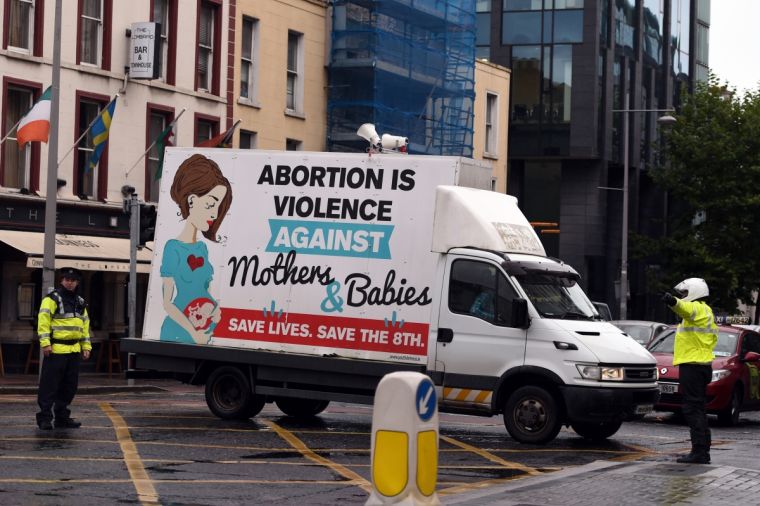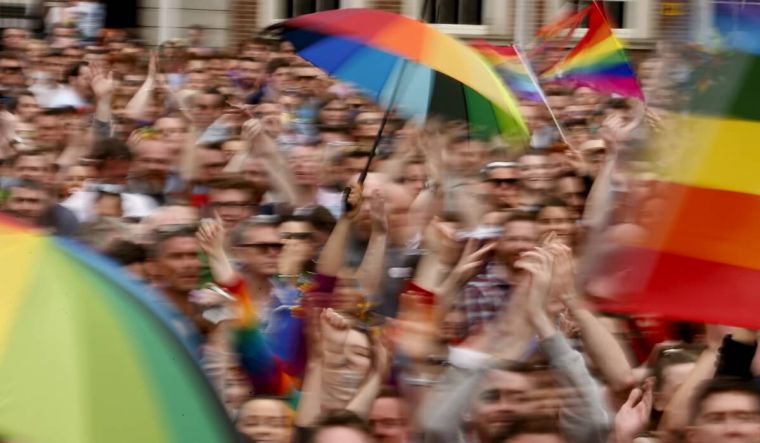Ireland's abortion referendum: Young liberals look to bury Church's influence
Momentum is with the 'pro-choice' side in the forthcoming, highly divisive referendum on abortion in Ireland on Friday, May 25.
The actors Saoirse Ronan, Jimmy Nesbitt, Cillian Murphy and Ciaran Hinds are among those featuring in a new social media video from the pro-choice group Together for Yes.
The Catholic Church in Ireland has issued numerous statements against abortion and in favour of the right to life. However it appears to be less influential than it once was in what remains a highly Catholic country culturally, but one that is changing and in which social liberalism has spread.

The abortion referendum, in which voters will decide on whether or not to repeal the Eighth Amendment of the Irish constitution which upholds Ireland's strict abortion laws, comes three years after Ireland became the first state in the world to endorse same sex marriage in a popular vote. In May 2015, 62 per cent voted to legalise same-sex marriage.
This time, the vote is on the amendment which means legal abortion is almost impossible in Ireland, even in cases of rape or fatal foetal abnormality. It is thought that around 3,500 women travel each year to the UK for terminations and another 2,000 illegally order abortion pills online. Since 1983, an estimated 170,000 Irish women have travelled to the UK to terminate their pregnancies.
One highly controversial aspect to the referendum is the government's stated intention to follow a vote for repeal with legislation allowing abortion on demand up to the 12th week of pregnancy. Defenders of the status quo say this would be a leap too far, and mean that Ireland's abortion laws would jump to being more liberal than those in England.
An opinion poll last month showed a clear majority in favour of repealing the eighth amendment, with some 47 per cent of voters saying they would vote yes, while 28 per cent said they would vote no. One in five voters were as yet undecided, according to the poll conducted for the Irish Times by Ipsos Mori.
Young voters may prove decisive, with support for repeal highest among younger, urban, female and higher income voters.
In January, another poll found that 56 per cent would back liberalisation of the law, with 29 per cent against and 15 per cent undecided or unwilling to say. Among those aged 18 to 24, support for change was at 74 per cent, compared with 36 per cent among over-65s.
It should be remembered that in May 2015, Irish citizens travelled from as far as Australia to vote in the equal marriage referendum.

Against this backdrop, Pope Francis has recently confirmed that he will visit Ireland in late August. It means the first papal visit to the country since the trip by John Paul II in 1979 comes just three months after what may be another blow for the standing of the Catholic Church.
Nonetheless, whatever disputes the mainstream majority may have with the Church – not to mention over its reputation when it comes to abuse – that there will be a massive display of love for Pope Francis is not in doubt. His popular touch appeals to the young, and he is also likely to make several gestures that will further endear him to the people. Dublin's Archbishop Diarmuid Martin has said the pope 'will want particularly to meet with the poor'.
Martin is president and host of the international World Meeting of Families, which takes place from August 21 to 26, at which the pope will preside at the concluding mass, most likely to be held in Croke Park on Sunday, August 26.
'He is coming for the World Meeting of Families, that is his primary purpose. He will focus on the many difficulties and challenges families have to face,' Martin has said.
'He doesn't want big shows, he wants to be just present with those who are marginalised,' Martin added.
But there is speculation that Francis may visit a prison, as he regularly does in Italy, and any encounters with the 'marginalised' are likely to be electric.
There is still the possibility that he will include a last-minute visit to Northern Ireland, deemed too sensitive back in 1979 when John Paul II came.
But this has not so far been announced, and on balance appears unlikely, not least thanks to the prospect of a return to a 'hard border' between Northern Ireland and the Republic.
As a senior Vatican source told Christian Today of the issue last year, when the trip was being planned: 'It complicates things quite a bit'.
Whether the abortion vote will 'complicate things' remains to be seen. This pope is on record as stating that opposition to abortion is no more important for Catholics than looking after the vulnerable, though he has not changed Church doctrine on that or any other issue.
There will be great love for Pope Francis in Ireland.
But with the young and fashionable opinion in favour of relaxing the abortion laws, there can be little doubt that the Church is no longer the influential force it once was.











